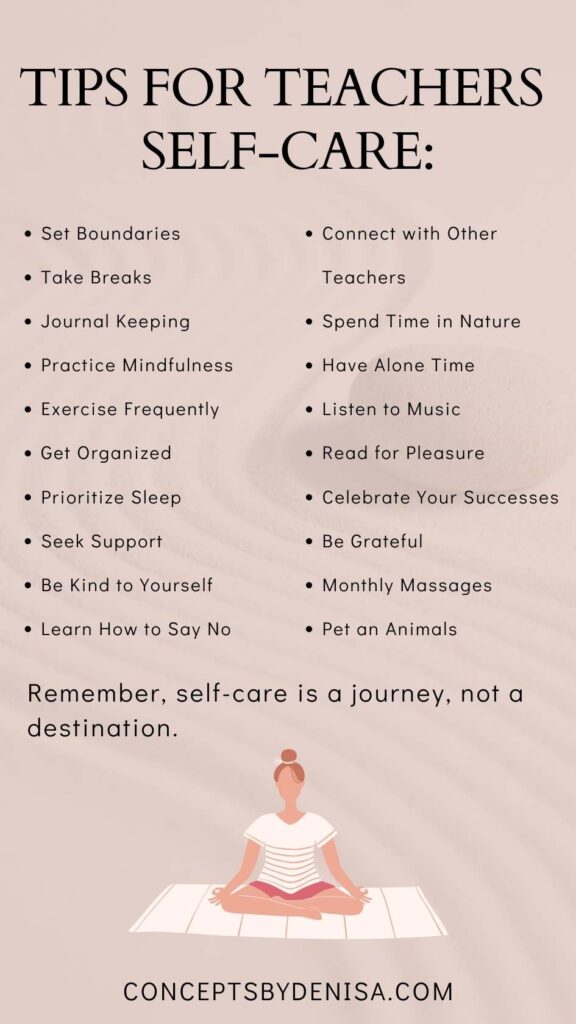About six in every 10 teachers experience job-related stress, affecting their sleep schedule, ability to enjoy time, and their mental and physical well-being. Because of stress and burnout, many teachers quit their careers to prioritize their health and take care of themselves. Teacher self-care isn’t about being indulgent or selfish. It’s about taking action to support your physical, mental, and emotional well-being.
Some common misconceptions about teacher self-care include it being selfish, taking too much time and effort, or you should prioritize your teacher’s career development instead of focusing on yourself. The reality is that you can’t pour from an empty cup and taking care of yourself benefits everyone and sets a positive example.
But why is self-care so crucial for teachers and which positive impact it has on their well-being, students, and the overall educational environment?
Read more for additional self-care tips and how to develop a healthy routine.
The Importance of Teacher Self-Care
Practicing self-care can be small, consistent actions, like taking a quick walk outside, embracing nature, setting boundaries, or just saying no to extra commitments. Teacher self-care is a non-negotiable nowadays, leading to reduced stress and increased productivity, fostering a calmer, more positive environment for students, and benefiting everyone in the educational system.
Let’s deep dive into the benefits of self-care for each segment.
1. Personal Benefits
The most positively affected area of teacher self-care is going to be the personal life. When practicing self-care you can reduce your stress level and prevent burnout, increasing your energy level and leading to sustainable personal growth.
A friend of mine, who is also a teacher, once told me this: “Taking breaks didn’t stop me from embracing my passion for teaching, but it helped me understand why I started this career in the first place”. Their words made me think that it’s a must to prioritize my mental health whenever I feel like drowning in to-dos.
However, self-care for teachers isn’t about bubble baths, pedicures, or massages (though those can be nice and can help!). Most of the time is as simple as watching your favorite series, playing with your pet, or catching up with a friend. These small actions can disconnect you from your job and they will give you a well-deserved break to recharge your batteries doing what you love.

2. Student Benefits
Imagine a classroom where the teacher seems calm, patient, smiling, and energetic. Now imagine another classroom where a teacher seems to lose their patience, hurrying the students, and telling the correct answers immediately. Which classroom do you think will have the best results academically?
When educators prioritize their well-being, they create a calmer and positive learning environment, allowing their students to feel secure and give their best in school. Stress and exhaustion can manifest in impatience and short tempers, but self-care equips teachers with emotional resilience. This translates to a more understanding presence, fostering a safe space for students.
Moreover, teachers who prioritize self-care become powerful role models for their students. Setting a positive example, teachers empower students to do the same, creating a ripple effect, where well-being isn’t stigmatized, but actively cultivated.

3. Educational Benefits
Burnout breeds turnover, with 55% of teachers reporting in 2022 that they plan to leave the educational field sooner than planned. This percentage has drastically increased from 37% of teachers in 2021, becoming highly concerning that the existing classrooms and students will not have enough educators.
Even though the #1 motivator for quitting is compensation, the following factors are heavy workloads, mental health, and safety issues. Therefore, prioritizing self-care seems to be crucial for the overall educational environment. Fostering a positive school culture starting with the teachers feeling joyful and motivated translates to engaging lessons, improved academic achievements, and a thriving learning environment.
Everyone, from students to teachers, benefits from the ripple effect of well-being effects in educators.

Overcoming Self-Care Barriers
Juggling lesson plans, student needs, and other demands, teachers often find self-care at the bottom of their to-do list. But prioritizing well-being isn’t a luxury; it’s a necessity. Recognizing the challenges that stand in the way of self-care – time constraints, workload, and even guilt – is crucial to overcoming them.
Here are practical strategies to help you integrate self-care into your busy schedule:
1. Master the Art of Saying No
Setting clear boundaries is key. Delegate tasks where possible, and don’t be afraid to decline commitments that stretch you thin. Remember, saying no to protect your well-being ultimately benefits your students and colleagues as well, but the most impact you will see is on yourself.
2. Seek Support
You are not alone! Connect with colleagues for mutual support and share self-care tips. Utilize school resources like counseling services or employee assistance programs. Consider joining a teacher wellness group or online community for additional inspiration and connection. You can even start reading blogs on self-care tips specifically for teachers (for example The Counseling Teacher).
3. Start Small to Go Further
Self-care doesn’t have to be elaborate. Incorporate short, mindful practices into your daily routine. Take a five-minute walk during lunch, do some deep breathing exercises or even stretching between classes, or practice gratitude before leaving work. These small acts accumulate and they will energize your day at school.
4. Use Available Support
You don’t have to pay for self-care help. Many schools offer some opportunities focused on teacher well-being. Take advantage of workshops, seminars, or online resources on mindfulness, stress management, and self-care strategies. Investing in your well-being through these programs can lead to significant benefits.
Conclusion
Remember, teacher self-care isn’t a one-time event; it’s a continuous journey. Start small, be consistent, and celebrate even the smallest victories. By prioritizing your well-being, you’ll not only feel better equipped to handle the demands of teaching but also create a more positive and enriching environment for your students and colleagues. So, take a deep breath, embrace self-care, and watch your teaching journey transform.
Additional Tips for Teachers Self-Care:
Mind & Body:
- Set boundaries: Say no gracefully and protect your personal time.
- Take breaks: Breathe, stretch, step outside – mini pauses can power your day.
- Journal: Reflect, release, and gain clarity on thoughts and feelings.
- Practice mindfulness: Meditation, yoga, or deep breathing can ease stress and center you.
- Exercise: Move your body for energy, mood, and stress relief.
- Get organized: Taming the chaos can reduce mental clutter and anxiety.
- Prioritize sleep: Rest your mind and body for optimal performance.
- Seek support: Talk to a therapist, counselor, or trusted friend.
- Be kind to yourself: Forgive mistakes, celebrate successes, and practice self-compassion.
- Recognize your limits: Saying “no” is a strength, not a weakness.
Connection & Engagement:
- Connect with other teachers: Share experiences, support each other, and find strength in the community.
- Spend time in nature: Go for a walk, hike, or simply sit outside and reconnect with the world.
- Have alone time: Recharge with quiet moments for solitude and reflection.
- Listen to music: Uplifting tunes can boost mood and provide a mental escape.
- Read for pleasure: Immerse yourself in a good book and spark your imagination.
- Celebrate your successes: Big or small, acknowledge your achievements and contributions.
- Be grateful: Take time to appreciate the good things in your life, even the small ones.
- Monthly massages: Treat yourself to some physical relaxation and pampering.
- Pet an animal: Cuddling a furry friend can lower stress and bring joy.
Remember, self-care is a journey, not a destination. Find what works best for you and integrate these practices into your life, little by little. A well-cared-for teacher is a happy, healthy, and inspiring teacher – for themselves and their students.
Related Articles:
The Only 30-Day Self-Care Challenge You’ll Ever Need
7 Ways to Build Self-Discipline That Lasts Forever
How to Empower Your Students to Become Independent Learners: 5 Methods
How to Be More Productive: 5 Tips to Increase Productivity
Save this Teacher Self-Care Tips list for later:






